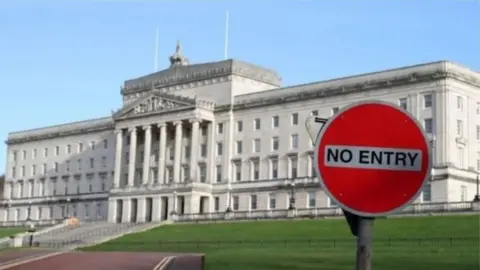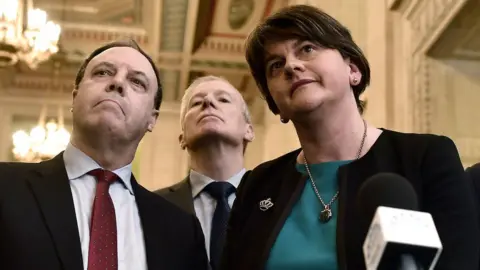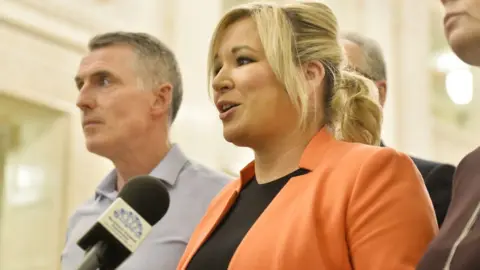As hopes of a Stormont deal are dashed, what comes next?
 PAcemaker
PAcemakerBack in the tumultuous days after the Renewable Heat Incentive (RHI) scandal brought down the Stormont Executive, both the DUP and Sinn Féin dug themselves into some very deep holes.
Sinn Féin said they wouldn't share power with Arlene Foster as First Minister.
Mrs Foster ruled out an Irish Language Act and vowed not to feed the "crocodiles".
Since then each side's negotiators have been trying to extricate themselves from their respective trenches.
As the talks stretched on it became clear Sinn Féin would be willing to drop their refusal to share power with Mrs Foster, but only in return for a clear win on the Irish Language.
Totemic significance
The DUP softened their position, acknowledging they would legislate for Irish, but only in the context of a wider culture act which addressed their community's concerns.
In reality what a law does matters far more than what it is called.
However the stand alone Irish Language Act versus an overarching Culture Act took on a totemic significance.
The package which the DUP and Sinn Féin have been wrangling over addressed this difference in a convoluted manner.
 Getty Images
Getty ImagesFirst a new Assembly would have been asked to consider a Respect and Culture Bill.
Then Irish and Ulster Scots Bills would follow.
All three measures would have become law, with the Irish and Ulster Scots Act eventually forming part of a consolidated Respect and Culture law.
Dancing on the head of a legislative pin
Sinn Féin sources say that no matter what the status of the consolidated law turned out to be they would have achieved their all important Irish Language Act which would have remained on the statute books.
However unionists would have pointed to the consolidated law as the wider measure they had championed all along.
So much for all this dancing on the head of a legislative pin.
During the last few days it's become clear that the DUP grassroots are concerned about what any kind of Irish Language law would mean for areas like public sector employment and road signs.
Impossible sell
Arlene Foster moved to rule out some of the more far fetched fears and DUP representatives were given a pro forma letter to reply to angry e-mails.
But senior DUP politicians remained doubtful that, however the package of language laws was dressed up, it would be impossible to sell.
Even if a deal had been reached, Arlene Foster and Michelle O'Neill would have faced a major challenge convincing the public they can work together after so many months of rancour.
London and Dublin have both argued that Northern Ireland needs a voice when it comes to Brexit, but the new Executive would have been an administration with two diametrically opposing views on the unique problems Brexit may pose for Northern Ireland.
 Press Eye
Press EyeAs things stand, it is the Secretary of State Karen Bradley who will now have to consider the way forward.
Action on a budget and a rates bill seems inevitable.
Will she cut MLAs wages, in line with the recommendations of an independent report?
At some point the negotiators may return to the talks table.
One joked that the Stormont process has plenty of commas, but no full stops. Maybe so but this point appears likely to be punctuated with a very long pause.
